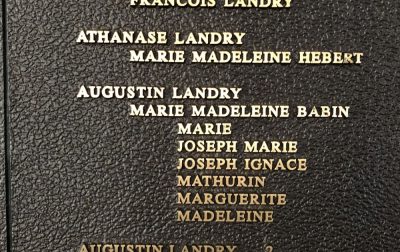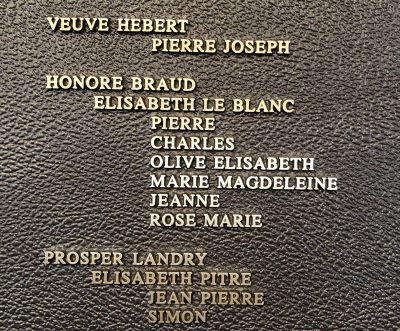From Acadian to Cajun: Part 11 – The Ones That Didn’t Make it
It’s time to finish up my Acadian to Cajun series that I wrote throughout the year 2020. I’ve covered all of the lines of my family that came to Louisiana from Acadie. I’ve learned a lot while writing this series. Before I started doing the research, I only knew that my family lines had been deported to Maryland and France. I discovered that other family lines were deported to Connecticut, Pennsylvania, Virginia, and Massachusetts. Some other family members had made their way to Ile St. Jean which was under French rule until 1758. From those places, they made their way to England, France, and St. Domingue (Haiti) before arriving in Louisiana – if they survived long enough.
It’s time to talk about the ones that didn’t make it. Obviously the ones that I descend from that didn’t make it were adults who had children already. I didn’t talk about all of the family members who were affected by the Grand Derangement in the original installments. Either I didn’t know about them or I didn’t want to overly complicate the stories at the time. But they deserve a mention.
From Installment 1 of my Acadian to Cajun series, I’ve already talked about Pierre Landry. He was the father of Augustin Landry who brought his family to Louisiana by way of Upper Marlboro, Maryland. I talked about him in my post about Landry Grandfathers. Augustin’s wife was Marie Magdelena Babin and her mother was Marguerite Bourg. I talked about Marguerite in Installment 10. But I didn’t talk about Marguerite’s father Alexandre Bourg who was still alive at the time of the Grand Derangement.
Can you imagine your whole life turning upside down at the age of 84? That’s what happened to Alexandre. He moved to Ile St. Jean sometime in the early 1750s. He was living with his daughter Anne and her husband Joseph LeBlanc in 1752 in Port Toulouse. He somehow escaped being Exiled after the fall of Louisbourg in 1758. He had been a royal notary for many years, so he may have still had some political connections on both the French and English sides of the conflict. He was 87 years old at the time. He was 89 years old when he died in 1760 in Richiboucton, New Brunswick, Canada.

Installment 2 covered the family of Antoine Breau and Marguerite Landry. Antoine’s mother Claire Trahan is listed below him. I could find no information about the ancestors of Marguerite Landry.
In Installment 2, I talked about the Charles Breaux family who was Exiled to Port Tobacco, Maryland, in 1755. Charles died in Port Tobacco sometime around between 1763 and 1765. His wife Claire Trahan made it to Louisiana where she lived a short while. Claire’s mother was Marie Helene Pellerin and she was alive in 1755, but she was living in Ile St. Jean which was still under French rule. She died August 27, 1756, at the age of 87. She was my 7x great grandmother.
In Installment 3, I talked about the Pierre Breaux family. Pierre was the brother of Charles Breaux. Some of his family were also Exiled to Port Tobacco and Pierre died before 1763. In the meantime his son Honore had been deported to Virginia and was sent on to England and France. He eventually married Elizabeth LeBlanc. She was the daughter of Victor LeBlanc and Marie Aucoin. I talked about the tragic deaths of Marie, her parents, and two of her young children by her second husband Gregoire Maillet.
But I didn’t tell you anything about Victor LeBlanc’s family. I doubt that anybody noticed because I was talking about so many people. The other reason I didn’t write about it was that I wasn’t sure about his family. When I looked around for information about him, I found different parents than what I had . My dad had obtained that information from Acadian researcher Bona Arnsenault. But recently more information was discovered that showed he was from a different family. I needed time to “Let go of” his previous parents and make the changes.
His parents were Pierre ‘dit Pinou’ LeBlanc (1685-1769) and Francoise Landry (1693-1767). I descend from siblings of both of them, so there were no new lines to add to the tree. Francoise was the sister of Pierre Landry who I mentioned earlier. Pierre LeBlanc and Francoise Landry were Exiled to Shrewsbury, Massachusetts. They both showed up on a 1757 Census of Acadian Exiles, as well as another one conducted in 1763. After the Seven Year War was over, many of the Acadian Exiles in Massachusetts decided to return to Canada. Around May 17, 1767, Pierre and Francoise, along with the family of their daughter Angelique (married to Germaine Dupuis, the first cousin of my ancestor Joseph Dupuis from Installment 9), boarded the schooner Abigail bound for Quebec. They arrived in Quebec on June 18. Sadly, Francoise died a few months later on October 3, 1767, in Lavaltrie, Quebec, at the age of 74. Pierre died on October 22, 1769, in Montreal at the age of 84.
In Installment 4, we talked about the Hebert family. They were Exiled to Georgetown, Maryland. If you’re keeping track, my ancestors were deported to four locations in Maryland: Upper Marlboro, Port Tobacco, Oxford, and Georgetown. They seemed comparatively the safest places to be Exiled. I could be biased since my ancestors survived being deported there. We descend from survivors of catastrophes through the ages. Just because a person is a Holocaust survivor doesn’t mean that they had an easy time of it. And it’s not like they had a choice.
I mentioned in that installment that Marguerite LeBlanc (the wife of Pierre Paul Hebert) was the daughter of Antoine LeBlanc and Marie Babin. I am a bit more sure of her parentage than back then and have found out more information about them. To make things perfectly clear, I found out that Antoine LeBlanc and Victor LeBlanc were double first cousins. That means that his father Antoine was the brother of Pierre ‘dit Pinou’ LeBlanc and his mother Anne Landry was the sister of Francoise Landry. Antoine LeBlanc (the grandfather of Marguerite) died before the Grand Derangement in 1739 in Grand Pre, Acadie. His wife Anne Landry (my ancestor) was Exiled to Massachusetts like her sister. She also died in Quebec in 1767 like her sister. Anne was 79 years old when she died. The younger Antoine LeBlanc (father of Marguerite) died in 1744 at less than 40 years of age. It is believed that his wife Marie Babin (my ancestor) was deported to Virginia, which is very unfortunate. They were sent on to England where they were treated poorly. Many of them suffered from smallpox and died. It looks like Marie was one of those that died in 1756 in that group.
In Installment 5, I told you about the very tragic story of Magdelene Granger, my 6x great grandmother. Her first marriage was to Alain Bujol. They had two children together in Ile St. Jean, but were later deported in 1758 at the fall of Louisbourg. She was the only survivor of her little family due to the circumstances of being Exiled. I found out that her father Joseph Granger was alive at the time of the initial deportations in 1755. I descend from his first wife Anne Richard who died in 1751. Joseph remarried shortly after that (he was 54 years old) to a Marguerite Gautrot. They had two sons before the deportations began. Joseph’s family was deported to Virginia. (cue the somber music) They were on a ship that arrived in England in June of 1756. There was no sweet reunion for Joseph and Magdelene. When she was married in 1760, Joseph is listed as deceased. She is my inspiration for perseverance!

Installments 6 and 7 were about the families of the brothers Etienne and Joseph Bugeaud. I descend from both of them.
In Installment 6, Joseph Bujol and Anne LeBlanc were sent into Exile with their family to Oxford, Maryland. I bet you were relieved to hear that they weren’t sent to Virginia! This history is so full of tragedies. Thankfully this little family fared well during their time in Exile. The family stayed intact and actually grew during their time in Maryland. This wasn’t true for their extended families. Anne’s mother Jeanne Bourgeois was Exiled to Cambridge, Massachusetts. She arrived in December 1755 and it was the last that was heard of her. Three of her children died in Liverpool, England, in 1756 and another one died in France in 1759. Jeanne was probably not aware of their deaths since those events happened across the ocean. We know that she had died before the 1763 Census at the age of about 70.
The story in Installment 7 was about Joseph Bujol’s brother Etienne and his wife Anne Forest. Anne was another of those with a tragic story. She lost her first husband during the Exile. What I didn’t mention in that installment was the fate of her parents Pierre Forest and Madelaine Babin. They were alive when the Grand Derangement began and they were deported to Weymouth, Massachusetts. He died within the first year of Exile at the age of 62. Madelaine shows up on the November 10, 1756, Census in Weymouth as a widow. There are no records of her after that time. So she probably died shortly after that before the age of 60.
Joseph and Etienne’s extended family was not Exiled during the initial deportations of 1756. They had several younger brothers and sisters who moved to Ile St. Jean with their parents Joseph Bujol and Josette Landry. They were there by the time of the Census of 1752. So while Joseph the younger and Etienne were Exiled with their families in 1755, other family members were able to stay at Ile St. Jean until 1758. It was at this point that Joseph the elder died. Either he died prior to the deportation or as a result of it. He was 59 years old. Josette and some of her children fled north with the help of a son-in-law who was part of the Acadian militia. They surrendered to the British and were held in Nova Scotia until the end of the Seven Year War. They made their way to Quebec and settled there. Josette eventually died on June 8, 1778, in Bonaventure, Quebec, at the age of 77. She did not see her sons Joseph and Etienne during the last 22 years of her life.
So that’s it. I previously covered the extended families of the ancestors I discussed in Installments 8, 9, and 10. I don’t think I’ll ever think of the Grand Derangement or even Acadie in the same way ever again. Hopefully I’ll always be aware of the difficulties my ancestors had to endure in order for me to be able to call myself a Cajun. Even though those I mentioned in this post didn’t survive the Exile to make it to Louisiana, I will still consider them honorary Cajuns! I think of it as a title of respect and they definitely deserve it.
For other installments of the “From Acadian to Cajun” series, click on the following links:
From Acadian to Cajun: Part 1 – Landry/Babin
From Acadian to Cajun: Part 2 – Breau/Trahan
From Acadian to Cajun: Part 3 – Braud/LeBlanc/Gauterot/Aucoin
From Acadian to Cajun: Part 4 – Hebert/Melanson
From Acadian to Cajun: Part 5 – Bourg/Granger
From Acadian to Cajun: Part 6 – Bujol/LeBlanc
From Acadian to Cajun: Part 7 – Foret/Bujol
From Acadian to Cajun: Part 8 – Hernandez/Babin



